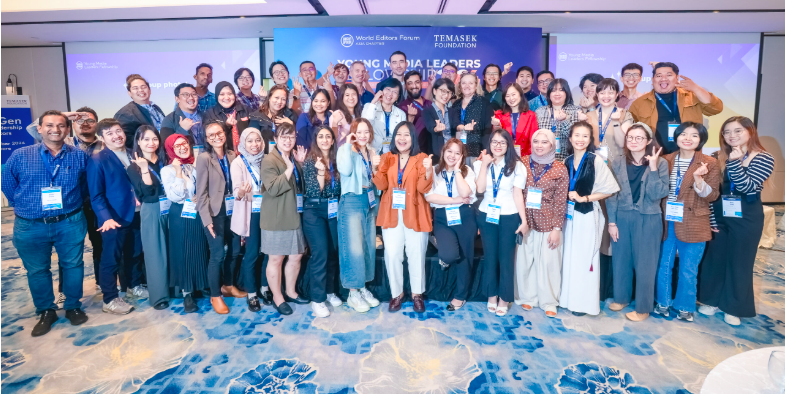Retaining and developing talented journalists to lead newsrooms into the future was the driving motivation for a newsroom leadership programme launched in Asia five years ago by WAN-IFRA. The initiative was in response to a pressing challenge identified by chief editors: newsrooms were losing skilled staff to competitors and public relations roles, leaving them frustrated and struggling to keep good people.
In 2019, a regional leadership development initiative, the Young Media Leaders Fellowship (YMLF), was established as a flagship project of the newly formed World Editors Forum Asia Chapter. Made possible through the support of Temasek Foundation, the fellowship has since empowered 107 emerging leaders from 20 countries across four successful editions, equipping them with essential leadership skills and fostering a vibrant community of future-ready newsroom leaders.
The programme’s impact is already being felt. According to WAN-IFRA’s forthcoming survey of Asian newsrooms, talent retention and development, while still a concern, has become a lower priority—an encouraging sign that efforts like the fellowship are bearing fruit.
The 2024 YLMF cohort, comprising 23 fellows from 10 countries, convened in Singapore in November 2024 alongside the Asian Media Leaders Summit. The gathering underscored the programme’s value to news organisations – providing participants with top-class training, peer connections, and tools to tackle the challenges facing modern newsrooms. Also in Singapore for further training held in partnership with Temasek Foundation were 15 YMLF alumni from previous cohorts, representing 15 news brands across eight countries. They reunited to enhance and update their leadership capabilities through a two-part programme: a business skills bootcamp and targeted training focused on delegation, prioritisation, and conflict resolution—all while managing the demands of editorial and cross-functional responsibilities.
The two groups—the YMLF 2024 intake and alumni—came together for a collaborative session that blended experiences and perspectives. The session opened with engaging roundtable discussions, where fellows delved into pressing leadership challenges and critical issues shaping the future of journalism, such as news avoidance and the integration of generative AI in newsrooms.
Building on the ideas generated during the roundtables, the session transitioned to “Leading with Vision,” featuring insights from Tammy Tam, Editor-in-Chief of the South China Morning Post (Hong Kong), and Uni Lubis, Editor-in-Chief of IDN (Indonesia). These newsroom leaders shared their expertise on guiding teams in the dynamic media landscape, offering strategies for effective leadership and innovation.
After working with both groups, Jeremy Clifford, the programme’s lead trainer, an international leadership coach and media expert, said leadership challenges were remarkably similar globally. Unsurprisingly, communication emerged as the highest priority for the young leaders: “Not only how they communicate: what they communicate, how they manage upwards and how they communicate with their direct reports and peers. We discussed the need to learn the skill of actively listening, constructively giving feedback, and leaving people feeling motivated, no matter how difficult the message. Another area of focus was delegation, as a skill to free your minds to think strategically,
“With the younger leadership cohort, we worked on developing a coaching style to leadership – so essential to what I call Leadership 3.0, that will help them to develop their teams, but also to self-assess their own leadership competencies and to look to how to build their leadership muscles for the heavy lifting we all must do in our leadership roles,” said Clifford.
A 2024 YMLP Fellow, Erie P. Rachmadany, who works as a News Producer for CNN Indonesia said the YMLF fellowship offered “a priceless experience, packed with “aha” moments, plenty of food for thought, and friendships that might just survive even our worst deadlines!”
Kanika Saxena, a writer from Bennett Coleman & Co in India, found the training to be an enriching experience that exceeded all expectations. “It offered a unique chance to connect with industry leaders and discuss important topics often overlooked in daily work. This experience has strengthened journalism and promoted knowledge-sharing across borders, making newsrooms more accountable. This fellowship was an eye-opener, introducing us to individuals with shared values yet diverse perspectives, leading to lasting friendships and great learning experiences.”
Zhang Xi Ying, a content producer at SPH Media, found YMLF to be an excellent introductory course for future media leaders. “The leadership skills taught, the chance to connect with fellow journalists and editors across the region, and the ideas exchanged on journalism and the media landscape in the new age: all these left me feeling so inspired, and ready for more.”
Among returning fellows, Yogie Fadila, an Editor at IDN Times, said the training offered editors an opportunity to redefine their role in the media industry. “This experience has opened up new perspectives on how editorial teams can shape business strategies while maintaining journalistic integrity and leadership, allowing us to lead in both content creation and revenue generation.”
Shea Driscoll, Digital Editor, South China Morning Post, said “The programme has evolved along with the needs of my job, making this return programme very much catered to my new reality and needs.”



